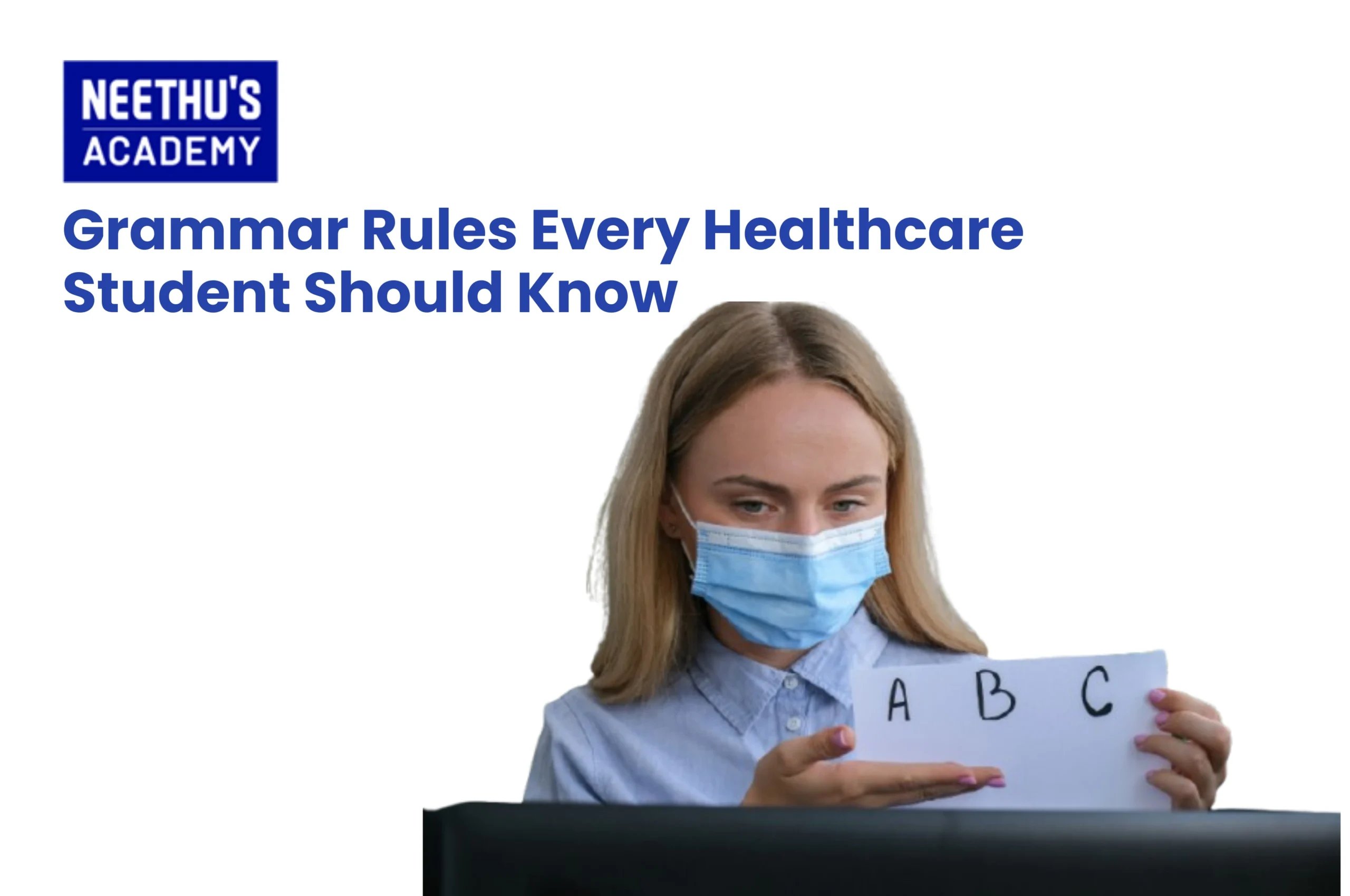It is absolutely possible to increase your score in IELTS speaking within one month if you are motivated, really well prepared, and…

Grammar Rules Every Healthcare Student Should Know
Grammar plays a critical role for healthcare students who aim to get high scores in either of the two tests: OET (Occupational English Test) or IELTS (International English Language Testing System). In both exams, correct grammar decides how clearly and precisely you will be able to provide information, describe the condition of patients, or write professional correspondence. One mistake in grammar may change the entire meaning, confusing the tenses when an event took place, which is important in patient care. Grammar also impacts your score regarding coherence, fluency, and accuracy, thus becoming a very critical building block for success. Beyond exams, healthcare professionals will use grammar daily in documentation, reports, and communicating with patients, where precision directly impacts understanding and safety.
Most Common Grammar Mistakes in Healthcare Exams
Even students who have a good vocabulary struggle when it comes to grammatical accuracy in an examination setting. The most common grammatical mistakes expected in OET and IELTS include incorrect tenses, misuse of articles, wrong prepositions, and subject-verb disagreement.
A common mistake is confusing tenses-saying “The patient is suffering from pain for two days” instead of “The patient has been suffering from pain for two days.” Mixing the tenses will render your sentence incoherent or grammatically incorrect.
Another issue is article usage. Articles like a, an, and the are small, yet important. For example, writing “He was given medicine” can sound incomplete in some contexts, while “He was given the medicine” specifies exactly which medicine.
Some of the most common mistakes involve prepositions. Students in health courses commonly say things like “admitted in hospital” instead of “admitted to hospital”, or “allergic with penicillin” instead of “allergic to penicillin.” Such errors may seem minor, but they do impact on your professional tone and clarity.
Another area where students lose marks is in subject-verb agreement. You must match singular subjects with singular verbs and plural subjects with plural verbs. For example, “The patient’s symptoms shows improvement” should be “The patient’s symptoms show improvement.”
Finally, many learners write run-on sentences or sentence fragments without connectors. Example: “The nurse examined the patient she gave the report to the doctor” should be written as “The nurse examined the patient and then gave the report to the doctor.”
By avoiding these mistakes, one can convey their information clearly and professionally both during exams and in workplaces.
Key Topics – Tenses, Articles, Prepositions
Some areas of grammar are more critical than others in terms of OET/IELTS preparation. The three most important topics are tenses, articles, and prepositions.
- Tenses – Describing Medical Conditions Clearly
Tenses help in describing when actions occur—past, present, or future—and in healthcare, this means telling the meaning of a medical statement.
- Present Simple is used for facts or regular routines: “Nurses monitor patients daily.”
- Present Perfect describes actions that started in the past and continue: “The patient has improved since yesterday.”
- Past Simple is used for completed actions: “The doctor prescribed antibiotics last night.”
- Future Forms express future actions or plans: “The nurse will check the patient’s blood pressure tomorrow.”
Consistency in tense is vital. For instance, “The patient was admitted yesterday and has been recovering well” is correct, but shifting between tenses not related to each other makes the writing confusing. In OET or IELTS, make sure all verbs in a paragraph align logically with the time you are describing.
Articles – a, an, the
Articles are small words that make a big difference in meaning.
Use “a” or “an” to refer to something general or not previously mentioned, such as “The patient needs an injection.” Use “the” when talking about a specific object or person already known to the reader, such as “The injection was given by Nurse Maria.”
In health care writing, article errors frequently produce unnatural-sounding sentences. For instance, saying “Doctor examined patient” does not use necessary articles. The corrected version is “The doctor examined the patient.”
When referring to general truths, plural nouns or uncountable nouns do not take articles. For example, “Doctors should maintain hygiene” is correct since it speaks about all doctors in general.
Prepositions – Precision in Medical Writing
Prepositions are notoriously tricky because their meaning often changes subtly according to context. And precision is vital in medical English. Common preposition patterns include:
- Admitted to hospital (NOT in hospital)
- Allergic to penicillin (not with penicillin)
- Worried about the condition of the patient
- Prescribed for infection
- Discussed with the consultant
To get better, learn prepositions with their verbs that accompany them-say, “rely on”, “suffer from”, “respond to”, rather than memorising prepositions out of context. Learning them in context will help you to use them appropriately in writing and speaking.
Examples from Medical Contexts
Grammar accuracy may change meaning significantly in medical communication. Consider these examples:
- Incorrect: “The patient is having fever since Monday.”
- Correct: “The patient has had a fever since Monday.”
- Incorrect “He was given a injection.”
- Correct: “He was given an injection.”
- Incorrect: “The doctor discussed about the results.”
- Correct: “The doctor discussed the results.”
- Incorrect: “She is responsible of patient care.”
- Correct: “She is responsible for patient care.”
- Incorrect “The nurses checks the patient daily.
- Correct: “The nurses check the patient daily.”
These small corrections show how grammar changes tone, accuracy, and professionalism. In exams like OET or IELTS, they demonstrate your command over English grammar and medical language.
Practical Exercises to Improve Accuracy
Grammar requires practice day in and day out. Devote some time each day, say about 15–20 minutes, to short grammar exercises. Some feasible methods include:
- Error Correction Practice: Take sample OET letters or IELTS essays, identify five grammatical errors, and rewrite them correctly.
- Conversion of Tenses: Write a short summary of a patient’s case in the past, present, and future to master verb forms.
- Article Gaps: Fill in the blanks in sentences such as “___ doctor examined ___ patient carefully.”
- Preposition Flashcards: Make flashcards for verbs and prepositions like “depend on,” “suffer from,” “talk to,” and go through them regularly.
- Speaking Review: Record your OET speaking practice and listen for any grammar slips or tense errors.
These exercises reinforce grammar rules while improving your writing and speaking fluency. Over time, they help you internalize structures so that you can use them naturally during exams.
Recommended Grammar Apps and Websites
Digital tools make grammar learning more efficient. Following are a few recommended grammar resources for healthcare students:
Grammarly: Instantly checks grammar, punctuation, and structure in your writing.
Cambridge Grammar in Use: Reference for all levels of grammar.
BBC Learning English: Free lessons and videos, including examples of medical communications.
OET Online Grammar Lessons: Focused specifically on healthcare communication.
Quizlet: Allows the creation of flashcards for verbs, prepositions, and tenses.
IELTS Liz Grammar Resources: Practical explanations and exercises tailored to IELTS grammar needs.
Learning grammar will be more interactive and enjoyable when combined with these platforms, along with daily writing practice.
Conclusion
Achieving Clear and Professional Communication Grammar is the backbone of clarity and professionalism in health care. Whether it be writing OET referral letters, IELTS essays, or even daily patient reports, grammar ensures your message is clear, respectful, and understandable. It also depicts competence and reliability as a healthcare professional. Mastering tenses, articles, and prepositions will not only raise your exam scores but also help in confidently communicating with patients and colleagues across cultures. Remember that grammar is not a mere system of rules; it is a bridge that connects accuracy with empathy and professionalism.
Frequently Asked Questions
Yes, grammar has a direct effect on your OET writing score under the “Language Accuracy” criterion.
Key areas include tenses, articles, prepositions, and sentence variety for coherence.
Learn the prepositions with verbs and practice them regularly in healthcare contexts.
Yes, grammar apps like Grammarly or OET-specific tools will improve both accuracy and confidence.
Related Blogs
- All Posts
- IELTS
- PTE
The reading module of the IELTS exam tests your comprehension skills on a variety of question types in a short period. Among…
Most test-takers find it hard to write a high-scoring essay in the PTE Exam. It is actually one of the modalities under…
Course Enquiry
Latest Posts
- All Posts
- canada
- CBT
- DHA
- French
- GENERAL
- German
- Haad
- IELTS
- IQN NEW ZEALAND
- MOH
- NCLEX-RN
- NHRA
- OET
- OSCE
- Pearson Vue
- PROMETRIC
- PTE
- TOEFL
- Back
- NCLEX - NGN
- Back
- OET FOR PHYSIOTHERAPIST
- OET FOR PHARMACIST
- OET FOR DOCTORS



